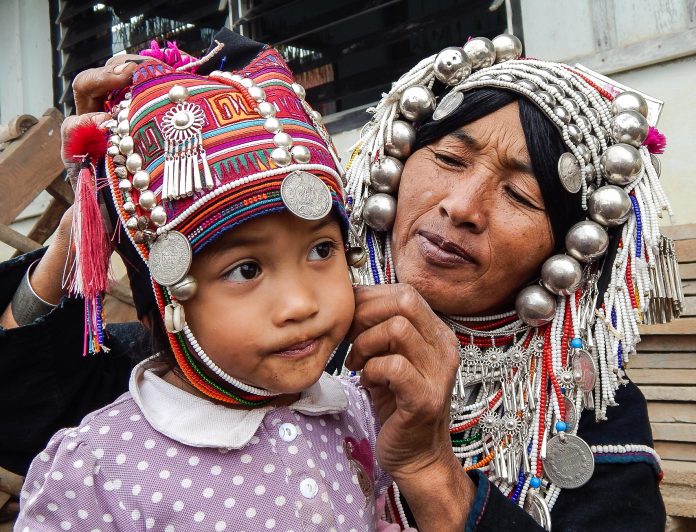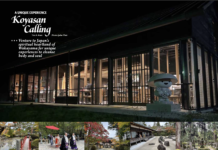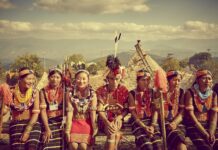
As elders pass on and youth surrender to the tide of modernisation, the once-proud villages who lived off the land are surrendering their diligently preserved traditions for basic food and healthcare
By Nathaniel Soon
Picture this: a crowd of girls clad in their finest embroidery gather outside a village hall to have a go on high wooden swings. Wearing indigo cloth skirts, intricate leg wraps and – most distinct of all – large silver headpieces lined with colourful beads and coins, they erupt in squeals of laughter as they’re launched, pair by pair, up into the air. Bamboo sticks thump the ground.
In this Akha Swing Ceremony, the girls step into womanhood.
But that was several decades ago. Today, the village pastor preaches fervently to a congregation on Sunday morning. Children ride motorbikes to school for lessons in Thai. No one swings anymore.

The Akhas are but one of many hill tribes that have migrated out of Tibet, Laos and China over the past century and found refuge in small villages in the mountains of Chiang Mai, Thailand. These stateless individuals, who total just over a million, live relatively primitive existences. The average hill tribe family lives on less than USD1 a day, which is 12 times less than most Thai citizens, making basic healthcare and education a distant reality.
In desperation, many young adults are abandoning their families and cultures for the cities in hope of a better life. But their inability to assimilate with society leaves many jobless or open to exploitation, human trafficking and prostitution.


Meanwhile, left behind in the hills are the elderly, who wait for sorely needed money that may never come. Should they fall ill, limited access to doctors and medicine means many deteriorate quickly. Missionaries and non-governmental organisations (NGOs) are striving to bring better healthcare to villages in recent years, but it comes at a price – a foreign agenda, such as conversion to new faiths.
I am worried about the change. Because to be Akha, you have to follow all the rituals.
-Ake Chermu, Akha shaman
“I am worried about the change. Because to be Akha, you have to follow all the rituals,” says Ake Chermu, a 67 year-old from the Chiang Rai province. The Akha shaman has seen neighbouring villages trade in their animist beliefs for the Bible and monotheism.
But it all seems inevitable. “The shamans and the spirit and cultural leaders have no place… the old, traditional knowledge that has been passed down to the community comes to an end,” says Dr Chayan Vaddhanaphuti, an anthropologist at Chiang Mai University.
The shamans and the spirit and cultural leaders have no place… the old, traditional knowledge that has been passed down to the community comes to an end.
–Dr Chayan Vaddhanaphuti, anthropologist


State intervention has generated new sources of income for these hill tribes by encouraging them to switch from planting vegetables and wheat to cash crops like coffee and tea, and earn tourist dollars tourists by selling local crafts and textiles. But researchers have criticised this transition, labelling it cultural commodification; in turn, the Thai government has declared its stance as one that acknowledges “no hill tribes, but only Thais”.
As custodians of a a culture that constantly faces the threat of being purged, the last members of these tribes are stretched thin between the need to safeguard traditions and their inability to meet basic needs.
Will the next generation live to see life hill tribe life? Unless high level initiatives are created, it’s likely that circumstances will force these people to give up their old ways of life, resigning these traditional practices to the history books – and young girls to other ways of celebrating womanhood.
Related: No Land for Nomads
Related: The Art of Eight Limbs
Related: Vanishing Roots










